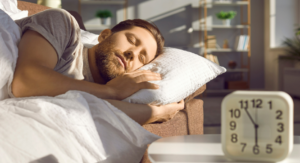Wondering if getting only 6 hours of sleep each night is enough for your health? As someone who values the importance of rest, I’ve delved into the topic to uncover the truth about the impact of this seemingly minimal amount of sleep. In today’s fast-paced world, finding time to rest adequately can be a challenge, but understanding the effects of our sleep habits is crucial for our overall well-being.
Is 6 Hours of Sleep Healthy
How Much Sleep Do We Really Need?
 To understand how much sleep our bodies truly require, it’s essential to consider our age group. Adults typically need between 7 to 9 hours of sleep each night to function optimally. However, this can vary based on individual factors such as genetics, lifestyle, and overall health. For example, teenagers often need around 8 to 10 hours of sleep due to their rapid growth and development during this stage.
To understand how much sleep our bodies truly require, it’s essential to consider our age group. Adults typically need between 7 to 9 hours of sleep each night to function optimally. However, this can vary based on individual factors such as genetics, lifestyle, and overall health. For example, teenagers often need around 8 to 10 hours of sleep due to their rapid growth and development during this stage.
Factors Influencing Sleep Needs
Several factors influence our individual sleep needs. These include lifestyle choices, stress levels, physical activity, and underlying health conditions. For instance, individuals with high-stress levels may require additional sleep to help their bodies recover and repair.Moreover, engaging in regular physical activity can improve the quality of sleep, making it easier to feel well-rested with fewer hours of sleep.
The Science Behind 6 Hours of Sleep
Benefits of 6 Hours of Sleep
 When considering 6 hours of sleep, it’s crucial to understand both its benefits and drawbacks. While the optimal amount of sleep for adults is generally recommended to be 7-9 hours, some individuals may find that 6 hours of sleep provides them with enough rest to function effectively. One benefit of 6 hours of sleep is the potential increase in productivity and alertness during the day.
When considering 6 hours of sleep, it’s crucial to understand both its benefits and drawbacks. While the optimal amount of sleep for adults is generally recommended to be 7-9 hours, some individuals may find that 6 hours of sleep provides them with enough rest to function effectively. One benefit of 6 hours of sleep is the potential increase in productivity and alertness during the day.
Risks Associated With Limited Sleep
On the flip side, consistently getting only 6 hours of sleep per night can pose certain risks to health and well-being. Research suggests that inadequate sleep is associated with a higher risk of various health conditions, including heart disease, obesity, and cognitive impairment. Lack of sleep can also weaken the immune system, making the body more susceptible to illnesses. It’s essential to consider the long-term consequences of chronic sleep deprivation and prioritize adequate rest to maintain overall health and vitality.
Comparing 6 Hours to Recommended Sleep Durations
Sleep Needs by Age Group
When comparing 6 hours of sleep to the recommended sleep durations for different age groups, it’s essential to understand that sleep requirements vary depending on one’s age. While adults generally need 7-9 hours of sleep per night for optimal health, adolescents require 8-10 hours, and younger children and infants need even more sleep to support their growth and development.
Long-Term Effects of Sleep Reduction
Consistently reducing sleep duration to only 6 hours per night can have detrimental long-term effects on various aspects of health. Research has shown that chronic sleep deprivation increases the risk of developing serious conditions such as heart disease, obesity, diabetes, and cognitive impairment.
Strategies to Improve Sleep Quality
Tips for Effective Sleep Hygiene
 As someone passionate about health and well-being, I understand the importance of maintaining good sleep hygiene. Establishing a regular sleep schedule is key; I suggest going to bed and waking up at the same time each day, even on weekends, to regulate your body’s internal clock. Create a relaxing bedtime routine that helps signal to your body that it’s time to wind down. This could include activities like reading a book, meditating, or taking a warm bath.
As someone passionate about health and well-being, I understand the importance of maintaining good sleep hygiene. Establishing a regular sleep schedule is key; I suggest going to bed and waking up at the same time each day, even on weekends, to regulate your body’s internal clock. Create a relaxing bedtime routine that helps signal to your body that it’s time to wind down. This could include activities like reading a book, meditating, or taking a warm bath.
Maintaining a healthy diet and regular exercise routine can significantly impact your sleep quality. Foods rich in tryptophan, such as turkey, nuts, and seeds, can promote the production of sleep-inducing hormones like serotonin and melatonin. Avoid consuming heavy meals, caffeine, and alcohol close to bedtime, as these can disrupt your sleep. Engaging in physical activity during the day can help you fall asleep faster and enjoy deeper sleep.

